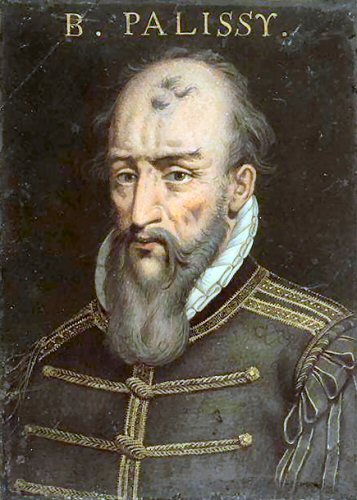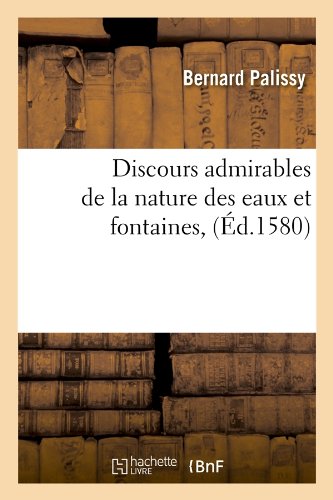Background
Bernard Palissy was born in 1510 in Saintes, Nouvelle-Aquitaine, France in a poor family.



(Discours admirables de la nature des eaux et fontaines, t...)
Discours admirables de la nature des eaux et fontaines, tant naturelles qu'artificielles, des métaux, des sels et salines, des pierres, des terres, du feu et des émaux... / par M. Bernard Palissy, ... Date de l'édition originale: 1580 Sujet de l'ouvrage: Sciences de la Terre -- Ouvrages avant 1800 Le présent ouvrage s'inscrit dans une politique de conservation patrimoniale des ouvrages de la littérature Française mise en place avec la BNF. HACHETTE LIVRE et la BNF proposent ainsi un catalogue de titres indisponibles, la BNF ayant numérisé ces oeuvres et HACHETTE LIVRE les imprimant à la demande. Certains de ces ouvrages reflètent des courants de pensée caractéristiques de leur époque, mais qui seraient aujourd'hui jugés condamnables. Ils n'en appartiennent pas moins à l'histoire des idées en France et sont susceptibles de présenter un intérèt scientifique ou historique. Le sens de notre démarche éditoriale consiste ainsi à permettre l'accès à ces oeuvres sans pour autant que nous en cautionnions en aucune façon le contenu. Pour plus d'informations, rendez-vous sur www.hachettebnf.fr
http://www.amazon.com/gp/product/2012540198/?tag=2022091-20
Bernard Palissy was born in 1510 in Saintes, Nouvelle-Aquitaine, France in a poor family.
Palissy has no formal education.
Palissy began as a painter of glass. Around 1539 he became interested in enameled pottery and after sixteen years of tireless experimentation, during which he burned his furniture and floorboards to fuel his kiln, perfected a technique for making a “rustic” enameled earthenware. The governor of Saintes, where Palissy settled, was the constable Anne, Duc de Montmorency, who had a keen interest in the fine arts and became Palissy’s patron. The patronage of such an influential noble soon brought Palissy into fame at the French court. Although he was an avowed Protestant, he was protected by these nobles from the ordinances of the parliament of Bordeaux when
in 1562 the property of all the Protestants in this district was seized. Palissy's workshops and kilns were destroyed, but he himself was saved, and, by the interposition of the all-powerful constable, he was appointed “inventor of rustic pottery to the king and the queen-mother” and commissioned to decorate the new Tuileries palace.
About 1563, under royal protection, he was allowed to establish a fresh pottery works in Paris in the vicinity of the royal palace of the Louvre. The site of his kilns indeed became afterwards a portion of the gardens of the Tuileries. For about twenty-five years from this date Palissy lived and worked in Paris, where in 1575 he began to give public lectures on natural history. Despite his lack of formal education Palissy’s lectures, according to Désiré Leroux, attracted the most learned men in the capital.
Palissy wrote two major books, Recepte véritable, published in 1563, and Discours admirables, published in 1580. In Recepte véritable, Palissy discussed a wide variety of topics, including agriculture (for which he proposed better methods for farming and for the use of fertilizers), geology (in which he touched upon the origin of salts, springs, precious stones, and rock formations), mines, and forestry. The second book, Discours admirables, probably incorporated Palissy’s Paris lectures. It, like the earlier work, dealt with an impressive array of subjects: agriculture, alchemy, botany, ceramics, embalming, engineering, geology, hydrology, medicine, metallurgy, meteorology, mineralogy, paleontology, philosophy, physics, toxicology, and zoology. Although he was well known as a potter, Palissy’s scientific work was not widely recognized in his lifetime.
The close of Palissy's life was quite in keeping with his active and stormy youth. He was protected against ecclesiastical persecution by the court and some of the great nobles, but in the fanatical outburst of 1588 he was thrown into the Bastille, and although Henry III offered him his freedom if he would recant, Palissy refused to save his life on any such terms. He was condemned to death when nearly eighty years of age, but he died in one of the dungeons of the Bastille in 1589.
Palissy’s “rustic” enameled earthenware brought him fame and a modest fortune.
His public lectures on natural history, published as Discours admirables (1580; Admirable Discourses), became extremely popular, revealing him as a writer and scientist, a creator of modern agronomy, and a pioneer of the experimental method, with scientific views generally more advanced than those of his contemporaries. Palissy was one of the few men of his century to have a correct notion of the origin of rivers and streams. He also wrote on the principles of artesian wells, the recharging of wells from nearby rivers, and forestation for the prevention of soil erosion, and presented plans for constructing “fountains” for domestic water supply.
(Discours admirables de la nature des eaux et fontaines, t...)
Palissy converted to Protestantism in about 1546. He was one of the first Huguenots in Saintes, and was much persecuted for his religion.
